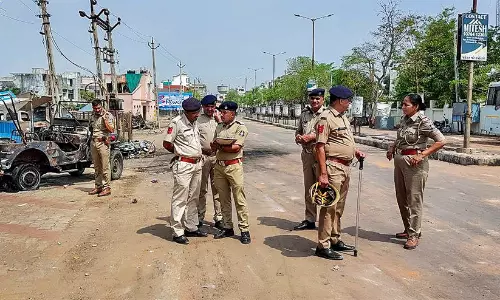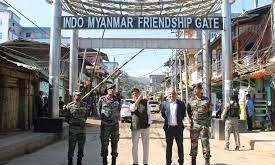
Union minister advocates India-Myanmar border fencing amid security concerns
text_fieldsNew Delhi: Union Minister Rajkumar Ranjan Singh has voiced support for the proposal to fence the India-Myanmar border, emphasising the need for increased security amidst the ongoing crisis in Manipur.
This call has surfaced alongside escalating demands to secure the lengthy border that spans over 1,600 kilometers and connects with Myanmar, affecting regions like Mizoram, Manipur, Nagaland, and Arunachal Pradesh.
Singh, the Minister of State for External Affairs and Education, emphasised the nation's obligation to safeguard its borders. While acknowledging the well-guarded and fenced western sector and border with Bangladesh, he highlighted the evolving scenario along the India-Myanmar border, stressing the necessity for boundary fencing.
"Maintaining national security stands as our foremost duty. Presently, the situation necessitates border fencing. It's imperative for every Indian to prioritise national security," asserted Singh, the Member of Parliament representing the Inner Manipur constituency.
These comments have followed recent decisions by the central government to terminate the Free Movement Regime (FMR), which previously allowed residents living near the India-Myanmar border to access limited territories in each other's nations without a visa. Manipur's state government had been advocating for the FMR's discontinuation amid tensions between the Kuki and Meitei communities in the region.
However, the newly appointed Chief Minister of Mizoram, Lalduhoma, conveyed his reluctance to the Foreign Minister, S Jaishankar, regarding the proposed border fencing. Lalduhoma expressed concerns about acknowledging historical errors committed by the colonial British government in dividing the Mizo population between India and Myanmar. Mizoram has offered refuge to over 35,000 Myanmar refugees fleeing conflict between the junta forces and insurgents.
This stance on border fencing sparked concern in Manipur, particularly among the valley-based Meiteis. They attribute the ongoing violence to alleged illegal immigration from Myanmar over several decades and a substantial drug trafficking network sustained by extensive poppy cultivation in the hills.
Singh proposed that border fencing could be implemented without creating an unwelcoming barrier by employing modern technology. Referring to advanced security measures like solar-powered laser fencing and surveillance cameras, he suggested these systems could detect movements effectively while allowing proper travel documentation.
He reiterated, "It is important to keep our borders sealed, safe, and intact, for which appropriate fencing is needed. That's the first basic step towards national security.






















